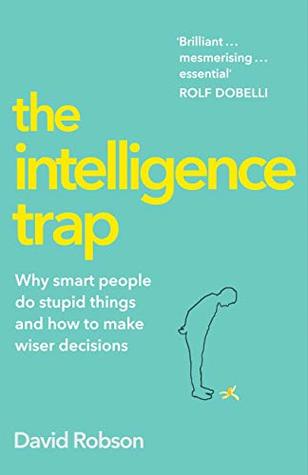More on this book
Community
Kindle Notes & Highlights
someone with high cultural intelligence would realise that, in Japan, you may need to explicitly ask for feedback before getting a response – even if the reaction is positive.
In some European countries, it’s much better to move directly to the matter at hand,
in India it is important to take the time to bui...
This highlight has been truncated due to consecutive passage length restrictions.
people are more likely to endorse the statement when it is presented in the gain framing; they passively accept the facts as they are given to them without thinking what they really mean.
That’s worth remembering: when playing roulette, don’t think you are smarter than the wheel.
you can be intelligent and irrational – as Stanovich had found – and this has serious consequences for your life.
higher IQs tend to consume more alcohol and may be more likely to smoke or take illegal drugs, for instance – supporting the idea that intelligence does not necessarily help us to weigh up short-term benefits against the long-term consequences.21
People who believe in the paranormal rely on their gut feelings and intuitions to think about the sources of their beliefs, rather than reasoning in an analytical, critical way.
smart people do not apply their superior intelligence fairly, but instead use it ‘opportunistically’ to promote their own interests
if we live in a technological and social bubble, and miss the regular argument and counterargument that could correct our biases. As a result, we simply accumulate more information to accommodate our views.
‘The more expert you are, the more vulnerable you are in many ways.’
One potential source of expert error could be a sense of over-confidence.
(a phenomenon that Fisher calls meta-forgetfulness). ‘People confuse their current level of understanding with their peak level of knowledge,’
‘In the beginner’s mind there are many possibilities; in the expert’s, there are few.’
As the expert brain chunks up the raw information into more meaningful components, and works at recognising broad underlying patterns, it loses sight of the smaller elements.
if you suffer from motivated reasoning, earned dogmatism, and entrenchment, you risk simply driving in circles, or worse, off a cliff.
rather remarkable that qualities such as your intellectual humility and capacity to understand other people’s points of view may predict your wellbeing better than your actual intelligence.
ask: ‘Would I have given the same weight to my friend’s judgement had she opposed the decision?’32 It sounds convoluted, but Lord’s studies suggested this kind of approach really can overcome our tendency to dismiss the evidence that doesn’t fit our preferred point of view.
The good news is that we can use Solomon’s Paradox to our advantage by practising a process called ‘self-distancing’.
our emotions and intuitions can also be valuable sources of information, directing our thinking in impossibly complex decisions and alerting us to details that have been accidentally overlooked through conscious deliberation.
The problem is that most people – including those with high general intelligence, education and professional expertise – lack the adequate self-reflection to interpret the valuable signals correctly and identify the cues that are going to lead them astray.
It wasn’t that the poorer performers lacked the words; they simply weren’t as careful to apply them precisely to describe the exact sensations they were feeling;
By pinning a concept on a feeling, it is easier to analyse it more critically and to disregard if it is irrelevant.
those three interconnected components – interoception, differentiation and regulation – can powerfully direct the quality of our intuition and decision making.21
if you are like most people, you may have been swayed by the subtle differences in the way the statements were presented – with the fainter, grey ink and ugly fonts making the true statements harder to read, and less “truthy” as a result.
you are more likely to endorse ‘woes unite foes’ than ‘strife bonds enemies’ – simply because it rhymes.
increasing a statement’s truthiness can be as simple as adding an...
This highlight has been truncated due to consecutive passage length restrictions.
‘But from a psychological perspective it made sense. Anything that would make it easy to picture or easy to imagine something should sway someone’s judgement.’
small, irrelevant details really do make a statement more persuasive.
the most powerful strategy to boost a statement’s truthiness is simple repetition.
‘The most brilliant propagandist technique will yield no success unless one fundamental principle is borne in mind constantly and with unflagging attention,’ Adolf Hitler noted in Mein Kampf. ‘It must confine itself to a few points and repeat them over and over.’
By repeating the claim – even to debunk it – you are inadvertently boosting its truthiness.
‘The real fun of life’, he wrote to a fan in 1986, just two years before he died, ‘is this perpetual testing to realize how far out you can go with any potentialities.’9
they have found that curiosity can rival general intelligence in its importance over our development throughout childhood, adolescence and beyond.
curiosity and the growth mindset would already constitute two important mental characteristics, independent of general intelligence, that can change the path of our lives.
‘In the nineteen-twenties, an engineer’s “half-life of knowledge”—the time it took for half of his expertise to become obsolete—was thirty-five years. In the nineteen-sixties, it was a decade. Now it’s five years at most, and, for a software engineer, less than three.’
That process – of forgetting, and then forcing ourselves to relearn the material – strengthens the memory trace,
they found that the better groups tend to allow each member to participate equally; the worst groups, in contrast, tended to be dominated by just one or two people.


